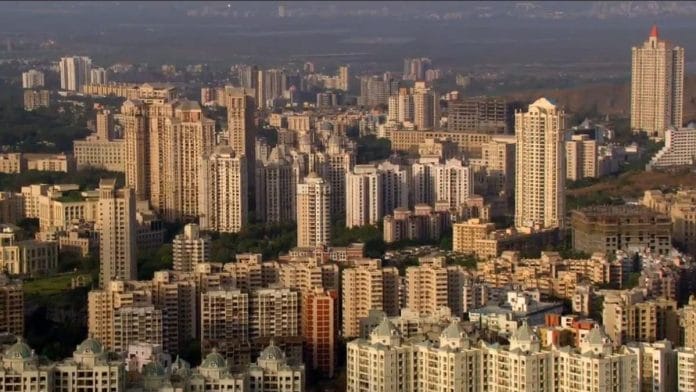New Delhi: With nearly one-third of the budget allocated for urban development initiatives lying unspent till mid-February, a parliamentary panel has raised concerns about both lack of fund utilisation and delays in implementation of crucial schemes by the Narendra Modi government.
The Ministry of Housing and Urban Affairs (MoHUA) had Rs 20,875.92 crore (33 percent of the revised budget) lying unspent till 14 February, despite its budget being revised down from Rs 82,576.57 crore to Rs 63,669.93 crore for 2024-25 in the revised budget, the parliamentary panel observed in its report that was tabled in Parliament Wednesday.
The ministry spent Rs 42,794.01 crore till 14 February.
The Parliamentary Standing Committee on Housing and Urban Affairs, headed by TDP MP Magunta Sreenivasulu Reddy, has recommended the ministry investigate the reasons and take corrective measures to utilise the funds.
A significant portion of the revised budget is lying unutilised, according to the ministry, due to lack of demand raised by states and Union Territories for central assistance under various schemes/missions such as Swachh Bharat Mission, Pradhan Mantri Awas Yojana-Urban (PMAY-U) and PM-eBus Sewa, among others.
In its report on the ministry’s demand for grants for the financial year 2025-26, the committee said, “…if this state of affairs continues then the targets set under any Mission/Scheme of the Ministry would be hard to achieve.”
It said that it is the ministry’s “responsibility” to generate interest and demand for central funds and assistance among stakeholders.
It is crucial that states and UTs proactively use funds as the Modi government pushes for large-scale urban reforms to tackle rapid urbanisation.
Recently, the Modi government announced its ambitious plan to invest Rs 1 lakh crore in cities through an ‘Urban Challenge Fund’. To avail of the fund, cities will have to raise at least 50 percent of project costs from the market through bank bonds and public-private partnerships.
Recommending the ministry to take corrective measures, the committee said, “The ministry should look into the reasons for states/UTs not coming forth and demands being not generated for various schemes amongst the states/UTs, and accordingly look for remedial measures to fill the gap.”
Also Read: 50,000+ flats built for Delhi’s poor have no takers. It’s an ivory tower-sized national waste
Slow pace of work
The budget allocation for various schemes and missions has been slashed due to various reasons, including the slow pace of implementation of projects by states/UTs, the ministry informed the committee. For instance, the budget estimates for the Swachh Bharat Mission were revised from Rs 5,000 crore to Rs 2,159.42 crore for the financial year 2024-25.
While projects in some of the large states including Andhra Pradesh, Tamil Nadu, and Gujarat, among others, are in the tendering stage, the ministry informed the committee, “…most of the cities in other states did not have a planned pipeline of solid waste projects and thus took time to finalise their plans, which resulted in less demand from the states.”
Likewise, the allocation for AMRUT was reduced from Rs 8,000 crore to Rs 6,000 crore for the current financial year due to “slow progress of projects in some of the states resulting in less demand for central share of funds,” said the committee report.
The introduction of the single nodal agency Sparsh by the finance ministry from August 2024 for states to claim central funding has “temporarily slowed down the flow of funds,” the ministry informed the committee.
“SNA-Sparsh is a reformative mechanism that will facilitate manifold savings of Government of India funds by preventing unproductive parking of funds at the last mile….the implementation of the SNA-Sparsh model is dependent on the presentation of bills by the state, which has temporarily slowed down the flow of funds…,” the ministry told the committee.
Finalise before announcing: panel
The committee observed that new schemes are announced in the budget, but funds allocated remain unutilised as necessary approvals are pending.
It pointed out that the PM-eBus Sewa scheme, which is aimed at augmenting the public bus transport infrastructure in tier 2 and 3 cities, was announced in the 2021-22 budget.
But the scheme was approved by the Centre in August 2023, and the fund was spent for the first time in the financial year 2024-25. Rs 1,300 crore was allocated to the scheme for 2024-25, which was later revised to Rs 500 crore.
Of the Rs 500 crore, Rs 438 crore was spent till 14 February.
The committee said that the National Urban Digital Mission (NUDM), which was announced in the budget last July with an allocation of Rs 1,150 crore, is yet to get Cabinet approval.
Referring to these delays, the committee recommended, “The ministry should conduct consultation with stakeholders and prepare and finalise the scheme document/guidelines prior to any budget announcement to avoid allocation and parking of funds for such schemes wherein approvals would spill to subsequent financial years.”
The Modi government has announced two new urban sector schemes—Urban Challenge Fund and Industrial Housing Scheme—in the 2025-26 budget and allocated Rs 10,000 crore and Rs 2,500 crore, respectively.
The committee said the ministry should ensure that guidelines are prepared at the earliest, approvals are sought without delay, and funds are utilised within the financial year.
In the past four years, the Modi government has announced various urban initiatives that are yet to be implemented.
For instance, the 15th finance commission had recommended incubation of eight new cities, for which Rs 8,000 crore was earmarked. While the ministry has received around 28 proposals from various state governments till last year, it is yet to finalise the names of states that will be provided funding.
The plan for developing transit-oriented development (TOD) in 14 cities, and 100 vendor markets in the country, among other budget announcements, are yet to see the light of day.
A senior ministry official, who wished not to be named, told ThePrint, “The projects are under consideration. A decision will be taken soon.”
(Edited by Radifah Kabir)






